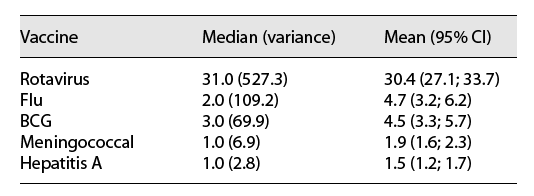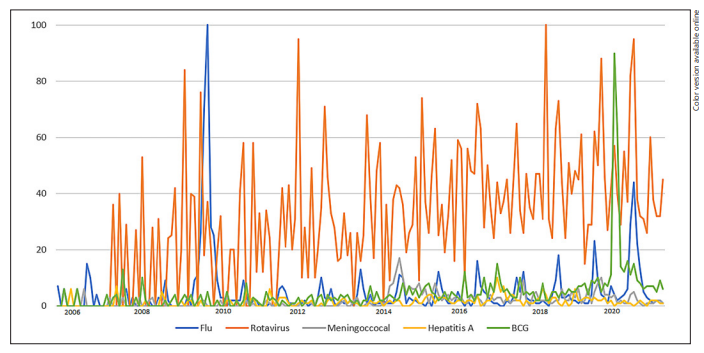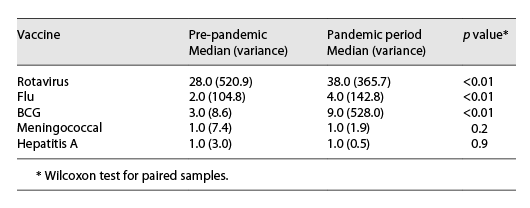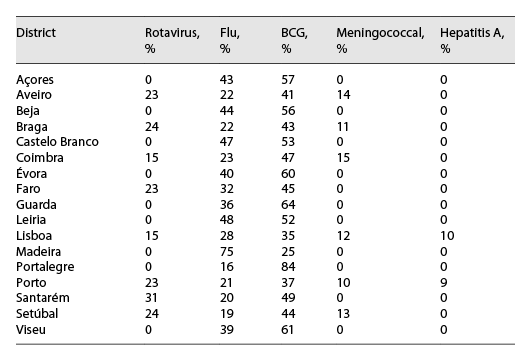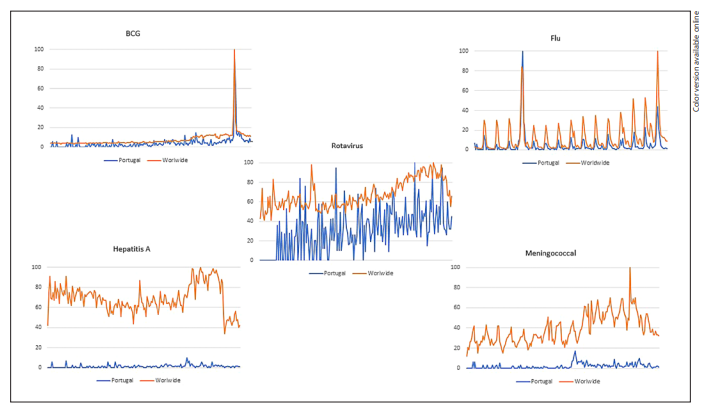Introduction
Google Trends (GT) is a web-based tool that allows access to data about worldwide searches in online search engines. It comprehends big data analytics on how, where, and how often a determined concept is searched. Regarding medical subjects, it enables access to health-information-seeking behavior which may then reflect in active changes in people’s perceptions about healthcare and even conduce to search for actual medical care, as highlighted in previous studies 1,2,3,4 5.
Since vaccination is one of the main primary prevention measures of healthcare in Portugal, with several important changes in the national vaccination program over the last 20 years, it is of high concern to discuss this topic with parents in every medical appointment. In addition, extra-program vaccine (EPV) and risk-based population vaccine (RBV) are even more susceptible topics of discussion since the decision of vaccination rests in the discussion between parents and healthcare professionals 6,7. Health literacy is furthermore increasingly affected by the spread of technology and easily available Internet access, as parents or caregivers do not need to wait for an appointment to search for information about health-related topics, namely, vaccination.
Therefore, the objective of this study was to identify a possible pattern in online searches about EPV and RBV and whether changes in the national vaccination plan and the COVID-19 pandemic contributed to an increase in parents’ interest. Furthermore, the authors intended to assess demographic disparities in online search patterns in Portuguese territory.
Materials and Methods
Online searches were assessed through GT (https://trends.google.com/; Google, LLC, Mountain View, CA, USA) for EPV (vaccines against Neisseria meningitidis, human papillomavirus, rotavirus, chickenpox, and hepatitis A) and also RBV (vaccines against flu and tuberculosis). The analysis was conducted for the time period between January 2006, as it was the first year that every studied vaccine was available in Portugal and June 2021. This period included the first year of the COVID-19 pandemic.
Query selection was performed using predefined GT’s topics (“meningococcal - vaccine,” “HPV - vaccine,” “rotavirus - vaccine/topic,” “chickenpox - vaccine,” “hepatitis A - vaccine,” “flu - vaccine,” and “BCG - vaccine”), as it includes language and extended synonym matching for every specific type of vaccine used in the search engine, in the Portuguese territory. Data were retrieved as relative search volume (RSV), which represents search interest over time for a given topic as a proportion of all searches on all topics on Google at that time and location. Values are indexed from 0 to 100, where 100 is the maximum search interest for the time and location selected. Vaccines with consistent interest of 0 were excluded from the final analysis. Analysis by district was performed as a proportion of search about each topic, in that region, for the entire studied period. Data analysis was performed using Statistical Package for Social Sciences® 26.0 and MATLAB® R2020a.
Results
Analysis of vaccines against rotavirus, flu, BCG, meningococcus, and hepatitis A was performed, and data were retrieved for the defined time period, with monthly analysis of RSV. HPV and chickenpox vaccines were excluded from the final analysis, due to persistent low interest during the studied time period (RSV 0).
Rotavirus vaccine had consistently the most variable search pattern, as shown in Table 1, scoring an RSV over 50 in a total sum of 31 months, the longest uninterrupted period between October and December of 2019. Hepatitis A and meningococcal vaccines had the patterns with the least variability, none with a registered RSV over 20.
As to abnormal peaks of interest, represented in Figure 1, the rotavirus vaccine accounted for the majority, with 13 months when interest doubled the basal mean, the highest RSV of 100 in July 2018. Meningococcal and hepatitis A vaccines registered 1 month of abnormal interest each, the first in October 2014, with an RSV of 17, and the second in April 2017, with an RSV of 10.
Two peaks of interest in the flu vaccination were also found, the first and most prominent in November 2009 (RSV 100) and the most recent in October 2021 (RSV 44). On the other hand, lower abnormal increases in interest in the flu vaccination happen to be found between September and November annually.
Although BCG had a consistent low interest during the studied time period, an anomalous pattern of high interest (RSV [11; 90]) was recorded from March to September 2021. A significant increase in search about every individual studied vaccine was found after 2017 (p < 0.01 in Mann-Whitney U for independent samples). That trend was not found for every type of vaccine during the pandemic period related to the infection by SARS-CoV-2, as shown in Table 2. Particularly, BCG represented a 200% increase in basal search values.
Analysis per demographic region, represented in Table 3, showed that Lisboa and Porto are the only districts where online search about hepatitis A vaccine is of note. On the other hand, flu and BCG vaccination are of global interest. Bragança, Vila Real, and Viana do Castelo were not included as insufficient data were retrieved by Google Trends®. Comparative search volumes, per vaccine type, between the national and worldwide setting, are represented in Figure 2.
Conclusion
Rotavirus vaccine was unsurprisingly the most searched, as it is the EPV administered earlier in life, when parents and children follow strict and regular contact with healthcare professionals. On the other hand, there are two formulations sold in Portugal (RotaTeq® and Rotarix®), which may cause more doubt and raise parental concern in the choice for either.
Rotavirus, which causes gastroenteritis in early infancy, is a more frequent and prevalent infection in Portugal, compared to meningococcal disease and hepatitis A, with decreasing incidence in overall population, although their morbimortality is higher. This may pose a bias, as more prevalent diseases may be more remindful by the parents that actively search about them at home, than the others that are more willingly brought up during appointments, translating in less interest in online search at home. Highest RSV about rotavirus was reached as the first discussions about including it in the National Vaccination Program arose in 2018.
The statistically significant increase in interest in vaccination after 2017 coincides with the revision of the National Vaccination Program in that year, when major changes occurred, namely, the switch of BCG to risk groups. The only abnormal search pattern for meningococcal vaccine coincided with the commercialization of Bexsero® in Portugal, in May 2014, representing the only weapon against the rise of infection by serotype B Meningococcus, following the most frequent serotype shift. On the other hand, the peak in the search for hepatitis A vaccination corresponded to the period of 2017 when an outbreak occurred in Lisboa.
Flu vaccination search peaks annually in the winter period, probably due to the national vaccination campaign and more prominently in 2009, when outbreak of A-flu happened in Europe. It is the authors’ opinion that the abnormal interest patterns seen during the COVID-19 pandemic for flu and BCG vaccination may translate two different scenarios: the first may have happened due to the fear of respiratory infections during the pandemic, as overlap symptoms would pose constraints in the access to differentiated healthcare, and the second, coincidently, during the period when an association between being vaccinated with BCG and milder COVID-19 disease was a propose. The later was afterward denied as more robust studies were presented 8.
Demographic analysis shows that only in Lisboa and Porto the percentual volume of search is spread across all types of vaccines since, in other districts, search about hepatitis A is residual. The same residual pattern was found for the meningococcal vaccine in every district, but not in Lisboa, Porto, Aveiro, Setúbal, Coimbra, and Braga. These five districts include the biggest urban areas in Portugal, which tend to be regions with more financial wealth and where parents would be more likely to afford high-cost vaccination schedules like the meningococcal vaccine. Since the flu and BCG vaccines are cost-free for risk groups, they would not pose a difficulty at the time of prescription in any Portuguese district, including the economically disfavored regions.
The persistent low interest in HPV and chickenpox vaccines that lead to their exclusion from the final analysis may translate to the reduced part of the Portuguese population to whom these vaccines could be advised. Chickenpox is a very common disease during childhood, and vaccination should cover adolescents and adults who have not presented this infection yet. On the other hand, HPV was an EPV for boys until 2020, when it was included in the National Vaccination Program that already covered girls since 2006.
This study did not access nor compare the scientific information presented in the searched resources, and because of that, it cannot assess if increasing interest in the vaccination topic translates into more health literacy, as there is a lot of online content that is not accurate or scientifically based. Another potential bias in the analysis is the inclusion of the meningococcal vaccine as a predefined GT topic, as it includes vaccines against serotype B, which was included in the National Vaccination Program in 2020, but also against serotypes ACWY which is still an EPV nowadays.
The sociodemographic scope of these findings should be interpreted within the generations’ online searching behavior. According to previous studies, baby boomers (born between 1946 and 1964) most commonly use their electronic devices to seek health information, although they are the second generation with the least percentual use of Internet volume worldwide, followed only by builders (born in 1925-1945). On the other hand, Generation Y (born between 1980 and 1994) use the Internet as the first method to search about health, but only half consider it a reliable source of information. Generation Z (born from 1995 to 2009) are more likely to search about positive health behaviors, such as sports and food, but are more reliant on their parents regarding health decisions. Our sample may include a predominance of searchers from Generation Y, although the boomers may be the group with the most interest in searching about health topics 9,10,11.
In conclusion, this study suggests that the search for vaccination is increasing, mostly driven by periods of outbreaks and pandemics, when the population values more this primary prevention measure, but also due to the update of the National Vaccination Program and the investment in child structured care. We all should be aware of the potential inadequacy of online resources and the spread of misbeliefs as may have happened with the interest in the BCG vaccine during the COVID-19 pandemic.
Statement of Ethics
Ethical approval was not needed as the retrieved data are open access and free for users worldwide. Ethical approval was not required for this study in accordance with national guidelines.













